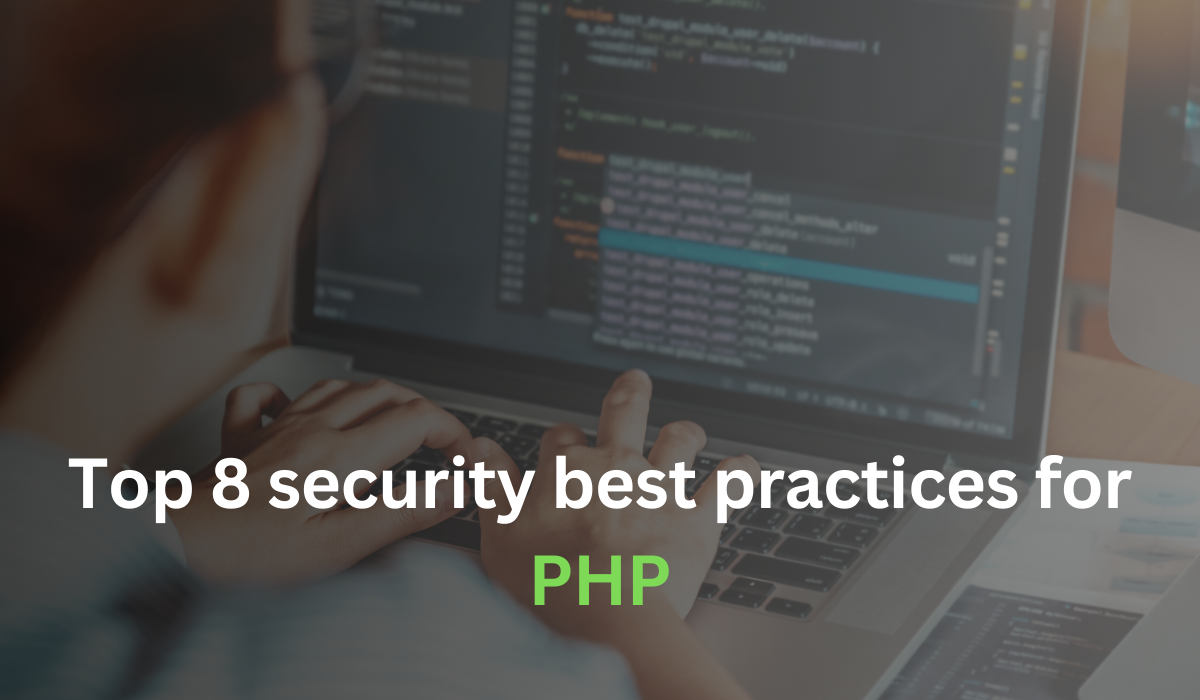When it comes to website and web application development, security is of the utmost importance. PHP is one of the most popular web development languages in the world. With its simplicity and versatility, it is no wonder that it is used by millions of developers to create dynamic, interactive websites. However, with this great power comes great responsibility.
While PHP is a powerful tool, it can also be vulnerable to security threats if not implemented correctly. That's why it is essential for developers to understand the best practices for PHP security. In this blog post, we'll discuss 8 key principles that should be kept in mind when using PHP to ensure a secure environment.
1) Keep Your PHP Version Updated
PHP releases new versions regularly to fix security vulnerabilities and bugs. Running an outdated version could leave your application vulnerable to known exploits. Be sure to check for updates regularly and upgrade as soon as possible. Additionally, some older versions are no longer supported and receive no security updates at all, so it’s important to ensure that you are running a version that is still being supported.
2) Validate All Input and Sanitize Output
Input validation ensures that any data entered into your application is safe and doesn't pose any security threats. Sanitizing output, on the other hand, removes any unwanted or potentially harmful elements before they are displayed to users. By doing this, you prevent attacks like cross-site scripting (XSS), which can exploit your application and cause harm to users. Therefore, it's essential to use a trusted input validation library and sanitize all user-generated content before displaying it on your site.
3) Use Prepared Statements to Prevent SQL Injection
SQL injection is a type of attack that targets the database by inserting malicious SQL code through input fields. This can result in a breach of sensitive information, data loss, and system damage. To prevent SQL injection attacks, it’s important to use prepared statements in PHP. Prepared statements separate the query logic from user input, making it much harder for attackers to exploit any vulnerabilities in the database.
4) Avoid Storing Sensitive Information in Cookies
While cookies can be a convenient way to store user information, it's important to remember that they are not completely secure. Storing sensitive information such as passwords or card details in cookies can make it easy for hackers to steal this data. Instead, store only non-sensitive information in cookies such as session IDs or user preferences. Also, consider implementing secure cookie settings to protect against attacks like cross-site scripting (XSS) and cross-site request forgery (CSRF).
5) Perform Regular Security Audits
Performing regular security audits is crucial to ensuring the ongoing safety and integrity of your PHP applications. While developers play a significant role in implementing security measures during the development process, it is equally important to hire dedicated PHP developers who are skilled in conducting comprehensive security audits. These audits involve examining your application's code, configurations, and infrastructure to identify any vulnerabilities or weaknesses that could be exploited by attackers.
6) Implement SSL for Data Encryption
SSL ensures that all data transmitted between the client and server is encrypted and protected from prying eyes. It’s particularly important for websites that collect sensitive information, such as passwords, credit card details, or personal information.
SSL also helps to establish trust between the website and the user, as it provides a visible indication of a secure connection in the form of a padlock icon in the browser address bar. Be sure to purchase a trusted SSL certificate and configure your server to use HTTPS for all pages.
7) Don’t upload all framework files to your server
When using a PHP framework, it may be tempting to upload all of the files to your server. However, this can create unnecessary security risks. Only upload the necessary files for your application to function, and ensure that all others are deleted or protected from unauthorized access. This can help prevent hackers from exploiting vulnerabilities in unused files and compromising your system. Regularly reviewing and updating your framework can also help keep your application secure.
8) Use URL Encoding
URL encoding technique helps to convert special characters in a URL into a format that is safe for transmission over the internet. It is particularly important when handling user input as it ensures that all data is correctly formatted before it is passed to the server. Failure to use URL encoding can result in security vulnerabilities that can be exploited by attackers. To use URL encoding, PHP developers should leverage built-in functions such as urlencode() and rawurlencode() that make it easy to encode and decode data for secure transmission.
Conclusion
In conclusion, prioritizing PHP security is paramount for all businesses. By diligently implementing the best practices outlined in this article, you can significantly mitigate the risk of security breaches and safeguard sensitive information. If you find any of the steps daunting, seeking guidance from a reputable PHP development company or security expert is strongly advised.
Remember, proactive action is key to fortifying your website's defenses. Don't delay securing your website – take action today to ensure a safer digital environment for your users and yourself.
You May also find this interesting to read: Discover Why PHP is Ideal for Your Next Web Development Project






Comments